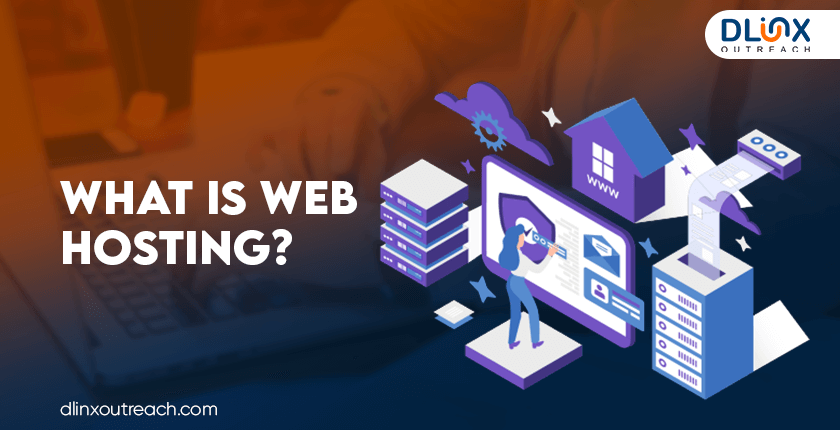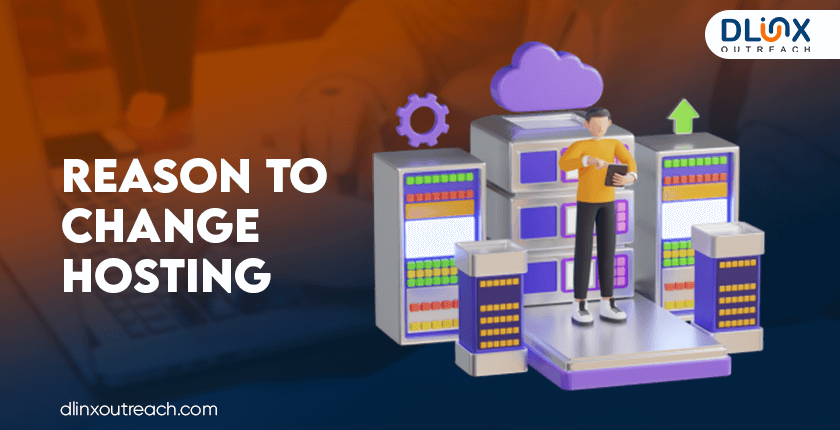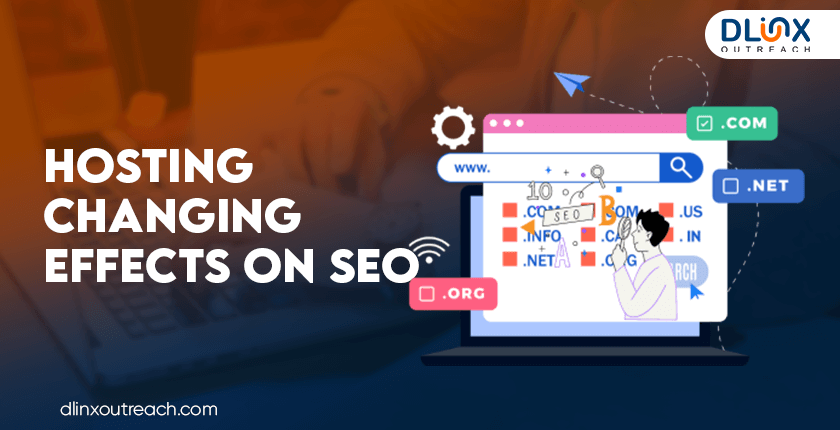Technically speaking, changing hosting should not affect the website’s SEO, but unfortunately, it does. This shifting could ruin your hard-earned SEO if not planned properly. However, these effects can be minimized by carefully designing the whole shifting process and taking all measures to keep these effects minimal.
So, before diving deep into this topic, let me explain what web hosting is and why we need to change the host.
What is Web Hosting?

Web hosting is a paid (mostly) online service that stores your website’s data, like files, photos, videos, text, etc., at a remote server and makes it available whenever a person tries to access your website through a browser. The hosting provider is responsible for making your content safe and secure and keeping your website up.
One can also host a website by setting up a server, but this requires a tremendous amount of laborious effort and skills, which require a full team for its maintenance and upkeep.
There are many web hosting providers, each with pros and cons. The list of some of the best hosting service providers can be found in this link.
Read | What is the Difference Between HTML Sitemap and XML Sitemap
Reason to Change Hosting

There are many reasons for changing hosting; the top 5 reasons are mentioned below;
Frequent Downtime: If your website frequently stays down, it’s time to shift the hosting. Downtime badly affects your SEO and lowers your ranking. It also negatively affects the user’s experience. This downtime is also detrimental to your business, especially if you are running an E-store or interactive website.
High Loading time: If your website takes too long to load, it indicates that you should consider changing the hosting. Anything over 2 seconds is considered a high loading time in the modern world. Users will not wait longer than 2 seconds for your pages to load; they will switch to your competitor.
Low Storage Space: If your hosting provider is not giving you space for expansion, you should consider switching it. Everyone wants to expand with more content and databases, which also require space. So, if your space is insufficient, you can not expand.
Backup Options: Backup and recovery are very important in the current era, especially when hackers are always on the look to steal your data. So, if your backup and recovery are not good enough, you should immediately shift to other options.
Suspension: If a hosting provider has very strict policies against different options and keeps suspending your website for different reasons, it is also time to change the hosting. Hosting should be more flexible and in line with the recent trends for better optimization.
Apart from the above five, the most observed reasons for changing the hosting are limited scalability, shared servers, poor customer services, limited control, slow page speed, limited customization, poor security and outdated technologies.
Read | Benefits of E-commerce SEO
Hosting Changing Effects on SEO

SEO is a real asset for a website’s ranking; no one wants to lose it at any cost. So, one should be very careful in shifting the host. A carefully crafted procedure will pass the SEO to your new server. Following are the effects on SEO while shifting to a new server.
Slow Crawling
Whenever a site is moved, whether locally or to another country, Google automatically stops its frequent visits to the site for crawling to avoid any confusion.
Mueller, the office bearer of Google, says that
“When it comes to moving hosting, you might see our systems initially slowing down crawling a bit. Whenever we recognize a hosting change, we want to ensure we don’t cause any problems. And so, we tend to slow down crawling automatically as a precaution“
Although you want to ensure a smooth shift to the new location, slow crawling will lower your ranking. Your indexing will also slow down, reducing traffic to your platform, as the new page will appear late in the SERPs.
This impact can be reduced by hosting your website on multiple servers at different locations. Google also considers it OK, which could solve the slow crawling issue.
Moreover, Google does not geotag the location of your server with your website. So, changing the hosting will not affect the geotagging of your website.
Down Time
If this transition is not executed properly, then it could make your website down. So, as your website is down, you will notice that Google’s bots will lower the ranking, as they do not present their user with an option that is not accessible.
This downtime may be caused by the domain name system (DNS) propagating, sometimes lasting more than 24 hours. The best way to keep your website running is to keep the old host intact while the DNS is propagated.
Reduced Loading Speed
If your new host provider uses a shared service, it could increase your pages’ loading time. Google is very strict regarding the loading time of a website.
Higher loading time will reduce your ranking, which means lower traffic, which can cause you to suffer a big loss.
This dip in the business can be avoided by carefully studying the new host. Do not share a server that already has many websites. Ensure your data’s safety and security are not compromised while sharing a server.
Restructuring of Website
Do not massively restructure your website while moving to a new server. Google’s crawler might consider it a new site, and your hard-earned indexing might be lost.
The best way to avoid this confusion is to reproduce the exact copy of your website at the new site and then slowly change its structure so Google and other search engines are not confused.
Server Location Change
Server location is very important in the SEO. If the server and website are in the same location, then Google will rank you higher. So, if you plan to change the server, keep it in the same location as your website.
301 Redirects
Whenever you try to move to another location, apply the 301 redirects to your old website. Rather than applying the blanket 301 redirect, apply it on a page-to-page basis, as it is fast and seamless.
This is also a way to let the search engine know about the transfer or moving of a website so that it passes the SEO to the new location. A user might not feel any redirect, but a Google bot lowers the ranking on the redirects.
Read | What is the Difference Between Brand Taglines and Slogans
Conclusion
SEO is earned through laborious and time-consuming efforts, and one definitely does not want to lose it at any cost. So, make sure to keep your SEO intact whenever you want to move your server to another location. Following are some of the effects of SEO.
- Google will slow the crawling whenever you move to a new location to facilitate the smooth transition. This transition can be made seamless by keeping both old and new servers intact until the shift is complete.
- Your DNS propagation may cause your server down for 24 to 72 hours, which can be mitigated by keeping the old server working.
- If you are moving to new server which is shared then it will increase your loading time which can be improved by using servers which is not shared.
- When you are moving to new location you often restructure your website. Google crawler consider it new website and does not pass the old SEO. So, it is recommended to not immedataly restructure your websites, rather plan it progressively.
- While moving to new server make sure that location of the new server and your website is same for better SEO.
- Redirect should also be properly placed to avoid the lowering in ranking.
In short, it is highly recommended to plan each and every step of shifting your hosting server to avoid lapse in the SEO, as it will reduce your ranking and traffic.
About Dlinx Outreach
Dlinx Outreach is an SEO agency known for optimizing your website for high SEO. Our agency has expertise in every attribute of SEO, and it can formulate customized strategies for your seamless shifting of a hosting server.
Our agency works for on- and off-page SEO, web design, link-building, competitor analysis, page speed, and more to improve your ranking in SERPS.
Furthermore, our team is well-versed in the recent trends and SEO tools that could help you earn unbeatable publicity, visibility, traffic, popularity, and long-term business. Feel free to contact us for further information.
Frequently Asked Questions
What are the main reasons for shifting a server?
If your server is often down or taking too much time to load, then you need to change the server. Moreover, if your server is not providing you with enough space for expansion and there are also security breaches, then you should think to move.
How SEO is affected in Shifting a host server.
Common SEO effects while moving to a new server include the increase in downtime, high loading time and, more importantly, lowering your ranking.
How to avoid downtime while shifting a server?
Down time can be reduced by keeping the old server working until your shifting is complete.
Should we also restructure the website while we shift a server?
No, restructuring is not recommended while shifting to a new server. Google consider a restructured website a new one and does not pass the SEO of the old site to the new one.
How Dlinx can be helpful in moving a host server.
Yes, Dlinx can help you to devise the whole shifting procedure so that your SEO is minimally affected.
Related Posts:
- Can a Blog be Used for the Link Building
- Does Google Rank ChatGPT Content
- Creative Link Building In Digital Marketing
- Should Black Hat Link Building be Avoided
- Why is Page Speed Important for SEO
- Does Google Use Social Signals for Ranking
- Benefits of Technical SEO
- How to Increase Google Ranking of My Website







